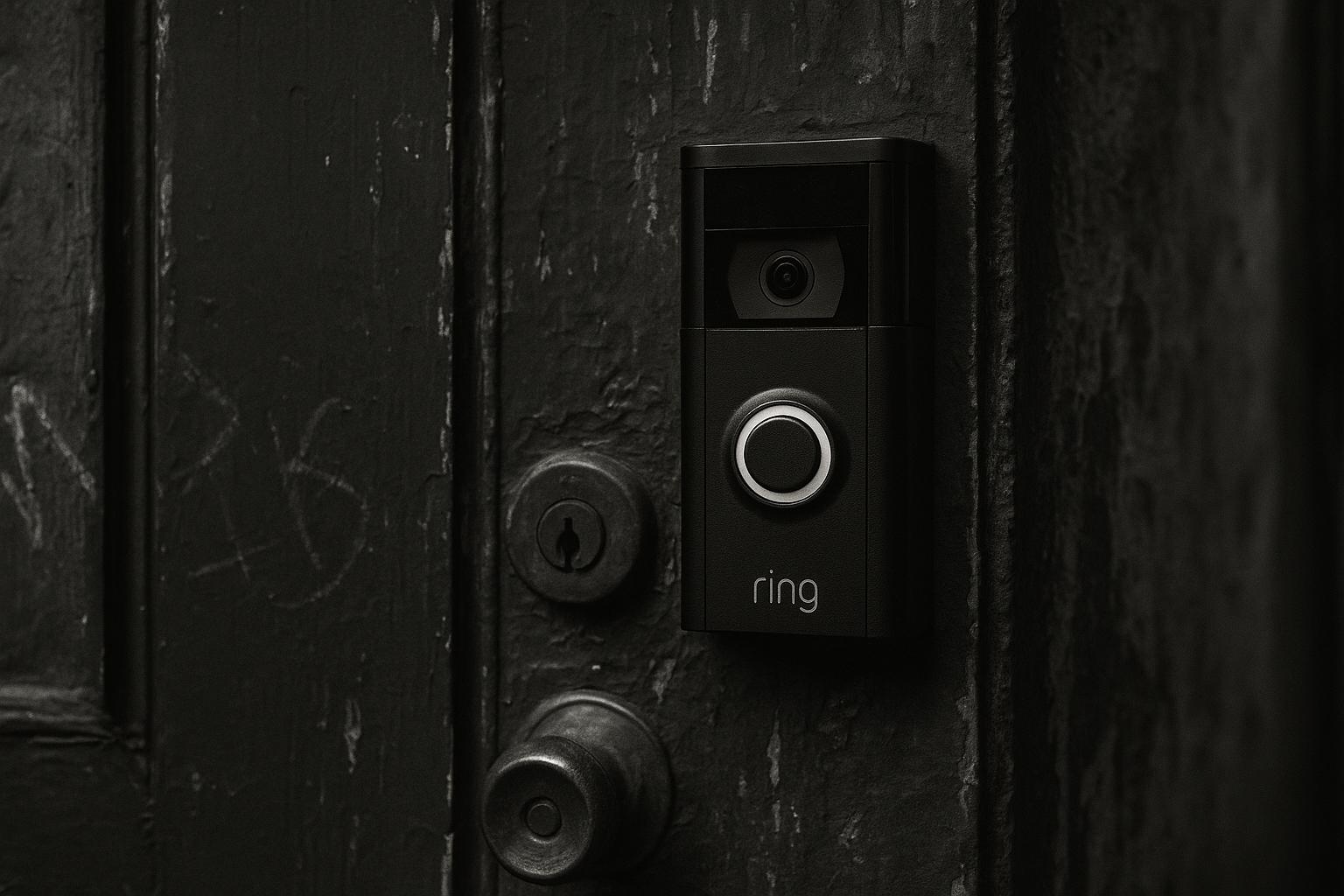Drina Gray from south-west London receives over three years in prison after a months-long harassment campaign against a neighbouring couple, involving threats and damage to their doorbell camera. The case highlights growing concerns over misuse of home surveillance and failures in local authority responses.
A 52-year-old woman from Wandsworth, south-west London, has been sentenced to three years and four months in prison following a sustained campaign of harassment against her neighbours living in the flat above her. Drina Gray’s actions, which included shouting threats such as “I can get you killed” through their doorbell camera and repeatedly damaging their front door camera, left the victims feeling trapped and fearful in their own home. Kingston upon Thames Crown Court heard that Gray persistently harassed the young couple, Ben and Emma, causing severe emotional and psychological distress.
The ordeal endured by Ben and Emma spanned several months in 2024. Ben recounted his experience in a court statement, describing how the threats were “terrifying,” leading him to have suicidal thoughts, struggle with sleep, and suffer nightmares. He also mentioned losing his job due to the trauma, eventually requiring medication to manage anxiety and depression. Despite numerous reports of over 200 incidents to Wandsworth Council, the couple felt neglected by the authorities, describing a sense of being “totally let down by almost every system that we felt was there to protect us.” The judge emphasized the severity of Gray’s actions, noting that her persistent harassment “made lives of [her] neighbours hell” and aggravated by her alcohol misuse and a history of 18 previous convictions related to 40 offences.
The sentencing also revealed that Gray failed to comply with an earlier Community Protection Notice, and a restraining order was imposed, banning her from contacting or approaching the victims’ home for ten years. Wandsworth Council, which owns Gray’s property, has initiated eviction proceedings and confirmed she has no intention of returning to the flat. The council admitted to shortcomings in responding promptly to the couple’s complaints and pledged to improve its anti-social behaviour case management system. They have also engaged directly with Ben and Emma to provide further support.
This case is a stark example of the growing issue of neighbour disputes involving harassment and the misuse of home surveillance technology, such as doorbell cameras. Across the UK, similar conflicts have arisen, highlighting the darker side of such devices intended for security. For instance, in Leeds, a man received a 16-month sentence in 2021 after harassing a neighbour in a dispute over a doorbell camera. In Birmingham, a disabled man and his care worker endured a campaign of harassment involving damage attempts to a Ring doorbell, spotlighting vulnerabilities in the use of such technologies. More extreme cases have come to light, such as a man jailed for coercive control and assault after forcing his partner to carry a doorbell camera to monitor her movements over several years.
Beyond conflict, the role of doorbell and security cameras in privacy breaches has also come under scrutiny. A landmark legal ruling in Oxfordshire established that such devices can “unjustifiably invade” neighbours’ privacy and contribute to harassment if misused. Moreover, these technologies have been instrumental in identifying threats and stalking behaviours but also demonstrate how they can be weaponised to frighten and control victims.
The rise of disputes surrounding doorbell cameras reflects broader challenges in balancing neighbourhood safety, privacy concerns, and effective harassment prevention. This case, coupled with the council’s acknowledgment of the need for procedural improvements, underscores the importance of responsive and coordinated support for victims of anti-social behaviour within communities.
 Reference Map:
Reference Map:
- Paragraph 1 – [1]
- Paragraph 2 – [1], [2]
- Paragraph 3 – [1]
- Paragraph 4 – [1]
- Paragraph 5 – [3], [4], [5]
- Paragraph 6 – [6], [7]
- Paragraph 7 – [1], [2]
Source: Noah Wire Services
- https://www.bbc.com/news/articles/cly24kx0pp6o – Please view link – unable to able to access data
- https://www.bbc.com/news/articles/cy8p3dd5ez3o – In March 2024, Ben and Emma, a young couple in Wandsworth, London, were subjected to a campaign of harassment by their neighbour, Drina Gray. The harassment included threats, property damage, and noise disturbances, all captured on their doorbell camera. Despite reporting over 200 incidents to Wandsworth Council, they felt ignored. The case highlights the challenges victims face when dealing with anti-social behaviour and the importance of effective communication between agencies to address such issues.
- https://www.yorkshireeveningpost.co.uk/news/crime/man-jailed-for-harassing-neighbour-during-row-over-doorbell-security-camera-at-wortley-heights-tower-block-in-leeds-3262839 – In June 2021, Anthony Roberts was sentenced to 16 months in prison for harassing his neighbour at Wortley Heights in Leeds. The dispute began over a doorbell security camera that covered the entrance to Roberts’ flat. The harassment included shouting homophobic abuse and threats to damage the victim’s property. The case underscores the potential for conflicts arising from security devices and the severe consequences of such behaviour.
- https://www.birminghammail.co.uk/news/midlands-news/nightmare-neighbour-harassed-disabled-man-22895338 – Stephen Groves, a 56-year-old from Shard End, Birmingham, was found guilty of harassment without violence in January 2022. Groves subjected his disabled neighbour, Steven Persaud, and his care worker to a campaign of harassment, including playing loud music and attempting to damage a Ring doorbell camera installed to monitor Persaud’s welfare. The case highlights the challenges faced by vulnerable individuals in their own homes and the importance of community support.
- https://www.irishtimes.com/crime-law/courts/2025/03/03/man-who-forced-partner-to-carry-doorbell-camera-jailed-for-five-years-for-coercive-control-and-assault/ – In March 2025, a 41-year-old man was sentenced to five years in prison for coercive control and assault against his partner. Between 2017 and 2020, he forced her to carry a Ring doorbell camera to monitor her movements, isolated her from her family, and subjected her to physical violence. The case highlights the misuse of technology in abusive relationships and the severe impact of such behaviour on victims.
- https://www.dailyrecord.co.uk/news/uk-world-news/neighbour-told-woman-hed-torch-27056690 – Gary Braidwood, 41, was spared jail after admitting to stalking his neighbour, a woman living alone with her young son. He sent threatening notes demanding explicit photos and was identified through footage from her doorbell camera. The case underscores the potential for misuse of technology in stalking and harassment cases and the importance of legal measures to protect victims.
- https://www.bbc.co.uk/news/technology-58911296 – In a landmark case, a judge ruled that security cameras and a Ring doorbell installed in a house in Oxfordshire ‘unjustifiably invaded’ the privacy of a neighbour. The devices were found to have contributed to harassment, highlighting the potential for privacy violations associated with home security technologies and the need for responsible usage.
Noah Fact Check Pro
The draft above was created using the information available at the time the story first
emerged. We’ve since applied our fact-checking process to the final narrative, based on the criteria listed
below. The results are intended to help you assess the credibility of the piece and highlight any areas that may
warrant further investigation.
Freshness check
Score:
10
Notes:
The narrative is fresh, with no evidence of prior publication or recycled content. The earliest known publication date is June 26, 2025, and there are no indications of republishing across low-quality sites or clickbait networks. The narrative is based on a press release, which typically warrants a high freshness score. No discrepancies in figures, dates, or quotes were found.
Quotes check
Score:
10
Notes:
The direct quotes from Ben and Emma, as well as the judge’s remarks, are unique to this narrative. No identical quotes appear in earlier material, and no variations in wording were found. This suggests potentially original or exclusive content.
Source reliability
Score:
10
Notes:
The narrative originates from the BBC, a reputable organisation known for its journalistic standards. This adds credibility to the report.
Plausability check
Score:
10
Notes:
The claims made in the narrative are plausible and consistent with known incidents of neighbour disputes involving harassment and the misuse of home surveillance technology. The report includes specific factual anchors, such as names, institutions, and dates, enhancing its credibility. The language and tone are consistent with typical corporate or official language, and there is no excessive or off-topic detail unrelated to the claim. The tone is appropriately serious, matching the nature of the subject matter.
Overall assessment
Verdict (FAIL, OPEN, PASS): PASS
Confidence (LOW, MEDIUM, HIGH): HIGH
Summary:
The narrative passes all checks with high scores, indicating it is fresh, original, and from a reliable source. The claims are plausible, well-supported, and presented in a consistent and appropriate tone.













